21.10.2024
Applications for CaCTüS 2025 are now open
Apply now for the 3-months CaCTüS internship in Germany in summer 2025!
3.7.2024
CaCTüS 2024 has officially started
 Nine interns will spend their summer with us in Tübingen and Stuttgart. Bethlehem (Ethiopia), Emmanuel (Nigeria), Sandro (Croatia), Tedd (Malaysia) and Veronica (Argentina) will do their internship at the MPI for Biological Cybernetics; Fay (Sudan) and Teodora (Serbia) at the MPI for Intelligent Systems Tübingen and Sareli (Peru) and Luis (Peru) at the MPI for Intelligent Systems Stuttgart. Besides working on their internship project in their assigned labs, interns will also receive soft-skills trainings, attend various workshops, and participate in scientific and social events to facilitate networking and cultural exchange. The interns have already met colleagues from the Tübingen Research Campus in a Welcome Event and have explored the MPI IS Stuttgart site as well. We are most grateful to the nine buddies who volunteer to be the interns’ point of contact for general questions inside and outside the institutes, but also offer guidance and moral support.
Nine interns will spend their summer with us in Tübingen and Stuttgart. Bethlehem (Ethiopia), Emmanuel (Nigeria), Sandro (Croatia), Tedd (Malaysia) and Veronica (Argentina) will do their internship at the MPI for Biological Cybernetics; Fay (Sudan) and Teodora (Serbia) at the MPI for Intelligent Systems Tübingen and Sareli (Peru) and Luis (Peru) at the MPI for Intelligent Systems Stuttgart. Besides working on their internship project in their assigned labs, interns will also receive soft-skills trainings, attend various workshops, and participate in scientific and social events to facilitate networking and cultural exchange. The interns have already met colleagues from the Tübingen Research Campus in a Welcome Event and have explored the MPI IS Stuttgart site as well. We are most grateful to the nine buddies who volunteer to be the interns’ point of contact for general questions inside and outside the institutes, but also offer guidance and moral support.
We would like to thank the Hanrieder Foundation for Excellence for making the supporting program of CaCTüS possible through the Hanrieder Impact Fund.
26.01.2024
CaCTüS Impressions
While preparations for CaCTüS 2024 are in full swing, we share some impressions from our last years’ cohort:
05.12.2023
Applications for CaCTüS 2024 are now closed
We are currently reviewing applications and are looking forward to the selection of our next CaCTüS cohort.
07.11.2023
Applications for CaCTüS 2024 are now open
Apply now for the 3-months CaCTüS internship in Germany in summer 2024!
CaCTüS is a fully funded 3-months internship at the Max-Planck-Institutes for Biological Cybernetics and Intelligent Systems and the Tübingen AI Center, located in Tübingen and in Stuttgart. Interns work on research projects spanning machine learning, theoretical neuroscience, behavioral experiments and data analysis.
Who can apply? Bachelor’s and master’s students in the fields of computer science, robotics, human computer interaction, maths, physics, engineering, neuroscience, psychology, cognitive science, bioinformatics and any other related fields. Applications from low- and middle-income countries are specifically encouraged.
22.09.2023
Successful Completion of CaCTüS 2023
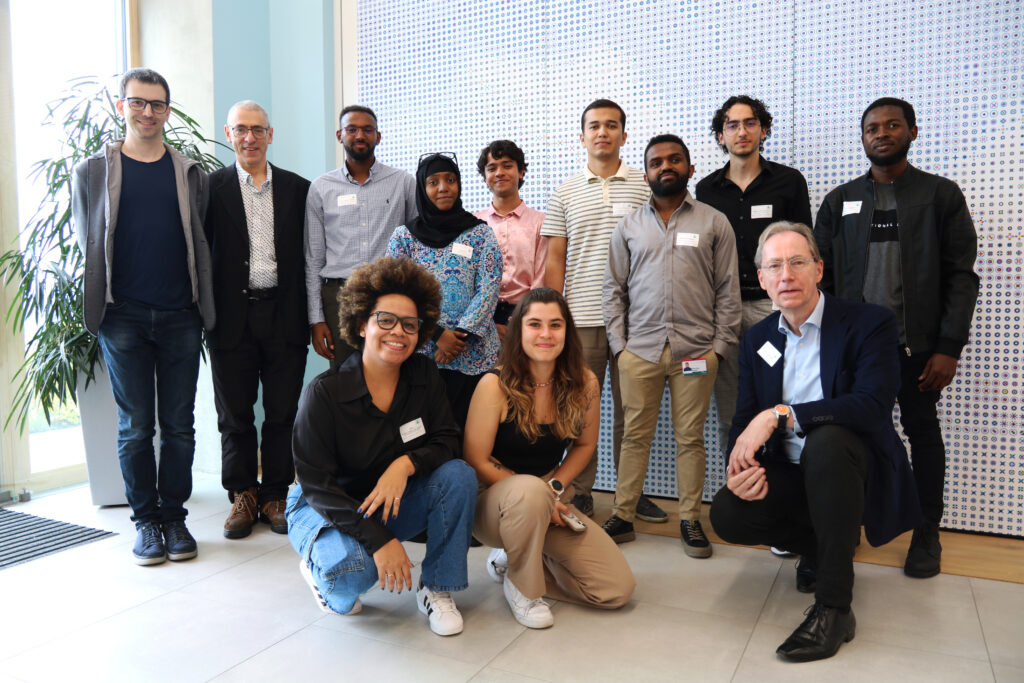
03.07.2023
CaCTüS 2023 has started
 CaCTüS 2023 has officially started with nine interns from Brazil, Ethiopia, India, Nepal, Peru, Sudan, Syria and Uzbekistan. Six of them will do their internship at the MPI for Biological Cybernetics, two at the MPI for Intelligent Systems in Tübingen and two at the Stuttgart site. In addition to the scientific training and mentoring that students receive in their research labs, the programme also offers various workshops on interdisciplinary key and soft skills but also scientific and social events to facilitate networking and cultural exchange.The CaCTüS Coordination Office will meet each participant regularly to talk about general concerns, progress, overall well-being, but also future career opportunities. In addition, every intern has been assigned a buddy, who is a PhD student from another lab, for the entire duration of their stay. The buddy is the first point of contact for general questions and moral support. They help resolve uncertainties about life in Germany and the research culture at our institutes.We would like to thank the Hanrieder Foundation for Excellence for making the supporting program of CaCTüS possible through the Hanrieder Impact Fund.
CaCTüS 2023 has officially started with nine interns from Brazil, Ethiopia, India, Nepal, Peru, Sudan, Syria and Uzbekistan. Six of them will do their internship at the MPI for Biological Cybernetics, two at the MPI for Intelligent Systems in Tübingen and two at the Stuttgart site. In addition to the scientific training and mentoring that students receive in their research labs, the programme also offers various workshops on interdisciplinary key and soft skills but also scientific and social events to facilitate networking and cultural exchange.The CaCTüS Coordination Office will meet each participant regularly to talk about general concerns, progress, overall well-being, but also future career opportunities. In addition, every intern has been assigned a buddy, who is a PhD student from another lab, for the entire duration of their stay. The buddy is the first point of contact for general questions and moral support. They help resolve uncertainties about life in Germany and the research culture at our institutes.We would like to thank the Hanrieder Foundation for Excellence for making the supporting program of CaCTüS possible through the Hanrieder Impact Fund.
17.10.2022
Preparations for CaCTüS 2023 have started
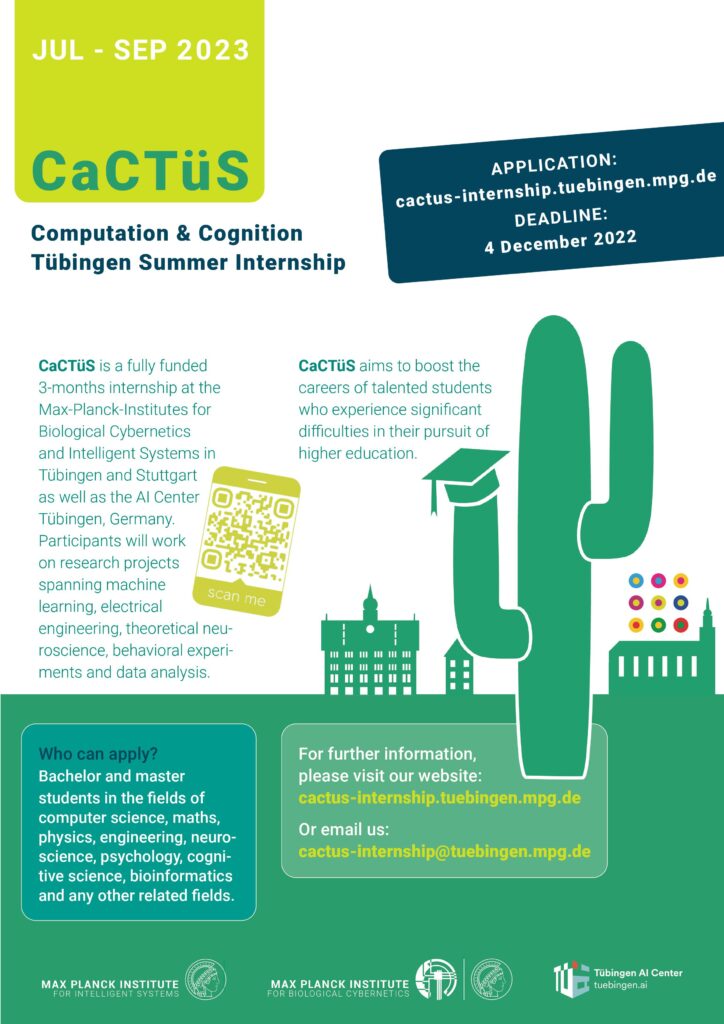
23.09.2022
CaCTüS: where talent meets experience
Successful completion of the first round of the international “Computation and Cognition Tübingen Summer Internship“(CaCTüS)
CaCTüS, the international internship program founded at the Max Planck Institute for Biological Cybernetics Tübingen, successfully concludes its first round. It is designed to boost the careers of young talented researchers whose access to top-tier higher-education is constrained. This year’s interns from five African and Asian countries impressed with the results of their three-months research projects.
It is a special evening at the Max Planck Campus Tübingen: Five research talents from Cameroon, India, Indonesia, Nigeria, and the Philippines present their work of the preceding three months to a fascinated audience.
The symposium is not just a scientific event like many others. The speakers in the spotlight were selected for the CaCTüS internship, a program for young scientists who face significant obstacles that hold them back in their careers. Whether these constraints be personal, financial, regional, or societal, the goal of the internship is to open doors for students, give them access to excellent scientific facilities, and connect them with outstanding researchers. During their fully funded three-months internship, the selected talents worked on scientific projects at the MPI for Biological Cybernetics in Tübingen.
Between research and networking
One of the five talents at the center of attention at this closing symposium is Olayiwola Arowolo. The young Nigerian who has earned his master’s degree in electrical engineering from Carnegie Mellon University, Rwanda, has now brought his expertise in machine learning to Tübingen. The research group which welcomed him studies the behavior and brain activity of zebra fish with the help of specially developed microscopes that follow the fish. “The problem is that zebra fish tend to make sudden movements, making it hard for the microscope to track them,“ Arowolo explains in his final presentation. His task was therefore to find better ways to predict the motion of the fish.
“This is a topic I thought I knew everything about,” comments Drew Robson, who supervised the project. “But Ola proved me wrong. He introduced a new probabilistic prediction algorithm to the lab that will significantly improve tracking performance.” Robson was so thrilled by the success of the internship that he decided to take on the role as the program chair, taking over for Franziska Bröker. Bröker, who created the program, is happy that her initiative and hard work paid off: “The internships turned out to be tremendously beneficial for the interns and also our local research community.”
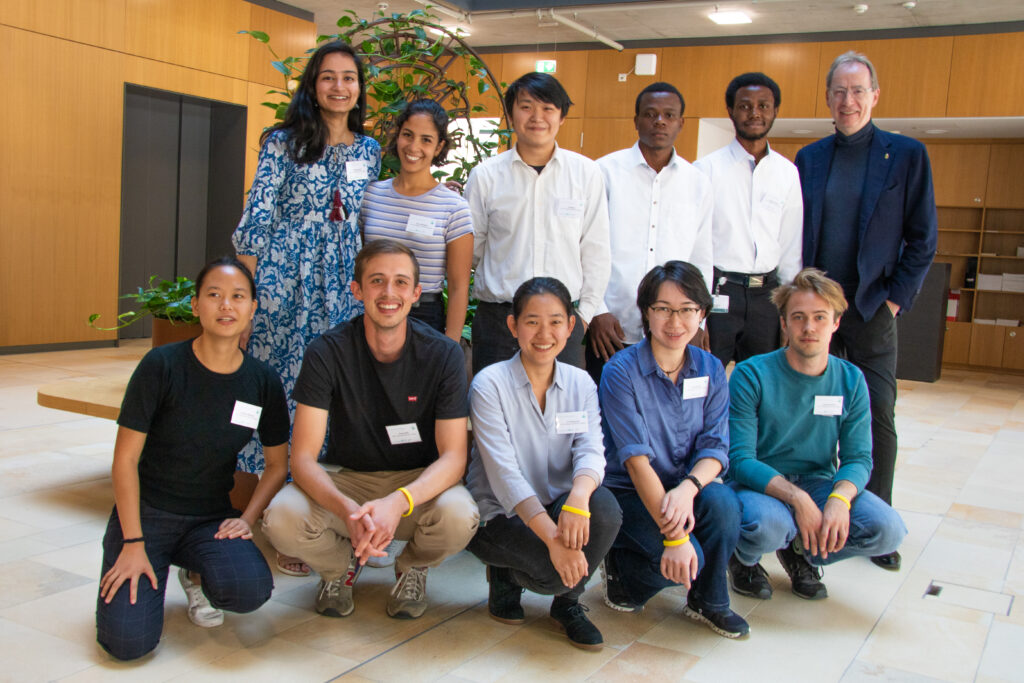
For the interns, it was a summer of many firsts. Many of them had never left their home country before, taken an international flight, or worked in a multinational team. To help them settle in, each of them was paired with a buddy, a local PhD student who helped them navigate daily life at the institute, pursue leisure activities, and feel more at home in their new environment. The program was also flanked by many complementary events, including a large range of soft-skill courses, career counselling sessions, and networking events. “The complementary events really helped me prepare for my next career step,” says Ramya Warrier, psychology and cognitive science graduate from India. The supporting program of CaCTüS was made possible by the Hanrieder Foundation for Excellence through the Hanrieder Impact Fund. The Hanrieder Foundation for Excellence, established in 2015 by Wolfgang Hanrieder under the auspices of the Max-Planck-Foundation, aims to support outstanding junior scientists in gaining experience at leading research centers abroad, and thus to promote the international exchange of excellence in research.
The CaCTüS internship is just the first step to an international stage for the five students. Olayiwola Arowolo, the machine learning enthusiast who helped improve zebra fish tracking, has already secured a PhD position in the Netherlands, while his peers are planning to fan out to other European countries and the US.
The new round of applications for CaCTüS internships opens on October 17. This time, ten internship positions will be filled, equally spread between the MPI for Biological Cybernetics and its neighbours, the MPI for Intelligent Systems and the Tübingen AI Center, a competence center for machine learning with participation of the MPI for Intelligent Systems and University of Tübingen. While the five students say their good-byes to each other and their hosts, preparations to select and welcome the next generation of promising young scientists are already underway.
15.07.2022
CaCTüS Comes to Life
First students from around the globe arrive in Tübingen to undertake research internship at Max Planck Institute for Biological Cybernetics.
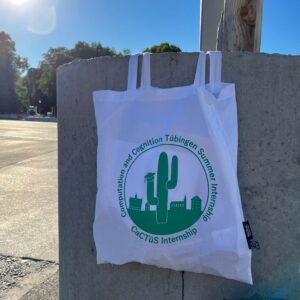
Arrival in Tübingen: The CaCTüS Coordination Team met the interns upon arrival to show them to their new homes for the summer. The internship aims to boost the careers of students who face significant constraints in their pursuit of higher education.
Arriving in the town with fairytale flair
It is the first weekend of July 2022 and five students wake up to travel to the other end of the world. Tübingen will be the farthest they have ever been from home. It is a big trip that promises much opportunity to discover, wonder and learn.
One by one they touch down from India, Indonesia, the Philippines, Cameroon and Rwanda. In the midst of the hustle and bustle at arrivals, they spot the familiar green cactus logo carried by the coordination team. After over a year of preparations, the welcoming team can hardly conceal their excitement that the internship finally comes to life.
The first days are tiring for the students as their brains run marathons to process all the new impressions. Everything is so different that everything looks the same. It is not surprising that the fairytale town appears like a maze at first.
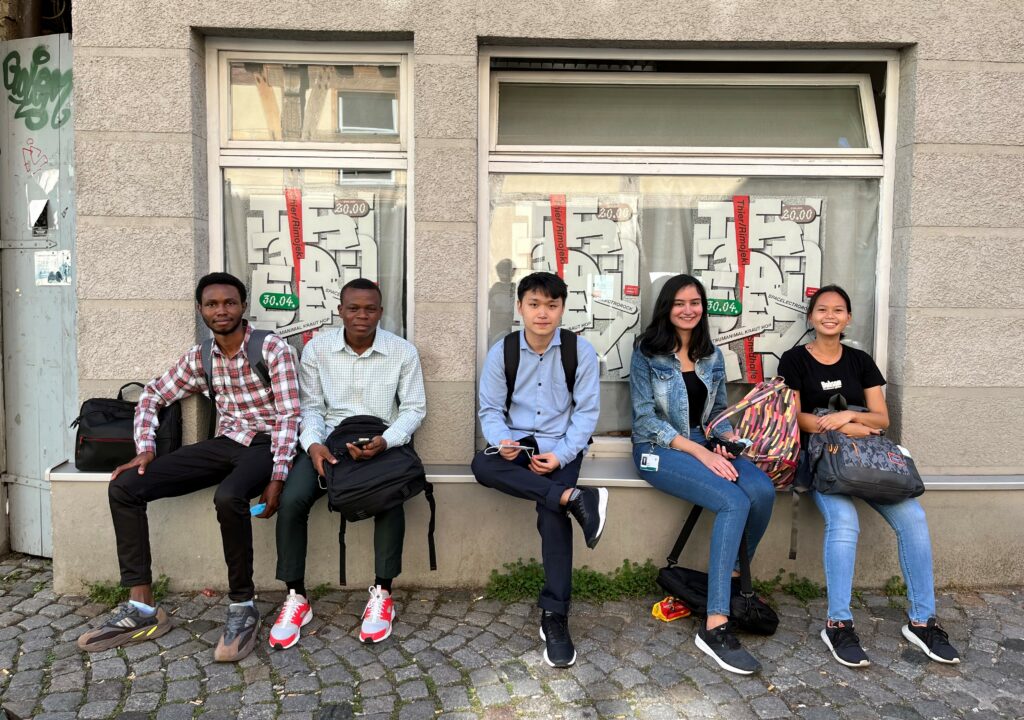
Becoming a Tübingen resident: Coming to Germany means a lot of paperwork. With registering at the city hall all five interns cleared the last bureaucratic hurdle.
Scientific and cultural exchange
The students form the first cohort of the newly established CaCTüS Internship (Computation and Cognition Tübingen Summer Internship). They were selected from 300 applications to pursue a 3-months research stay at the Max Planck Institute for Biological Cybernetics. The aim of CaCTüS is to boost the careers of excellent students who face significant constraints in their higher education. “This internship is a once-in-a-life-time opportunity for me and I am really excited for the next months,” says Ange Joel from Cameroon.
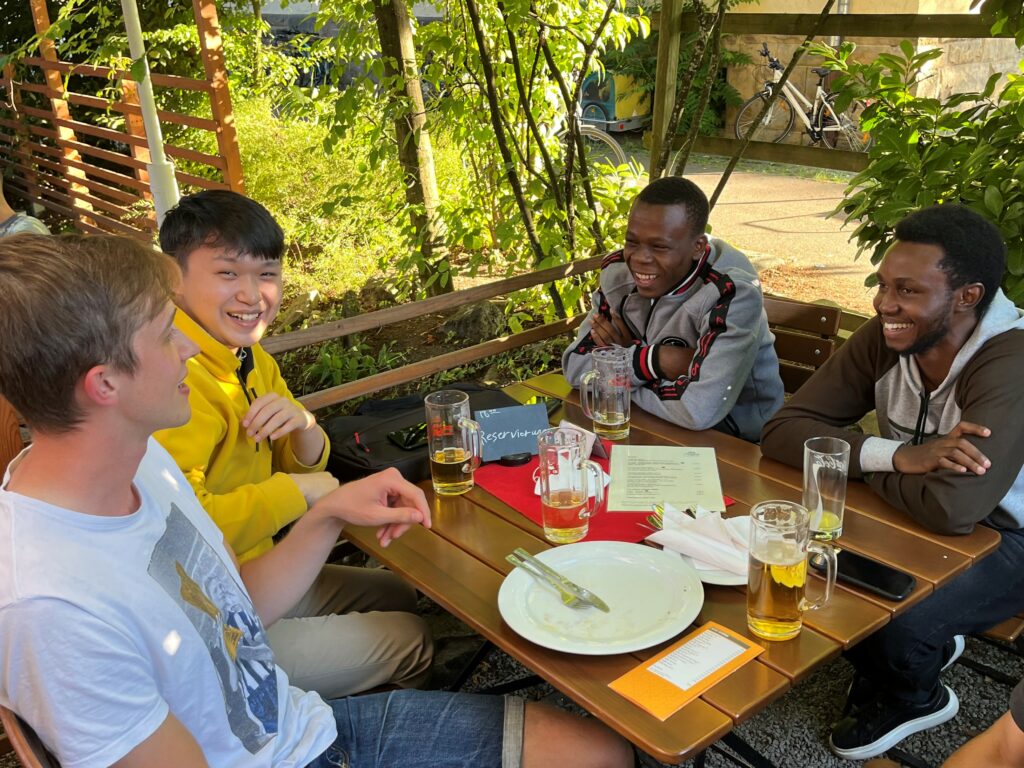
Swabian Social: CaCTüS not only supports scientific exchange but also connects people. To celebrate their first week at work, the interns met the scientific community over Käsespätzle and Kellerbier.
Over the summer the interns will work on individual research projects supervised by experienced scientists. Besides furthering their research skills, the supporting programme of CaCTüS fosters excellence by enabling the interns to enhance their academic soft-skills, as well as to build an international network and connect with the Max Planck research community. “I have always wanted to research the brain and mind and it is unfortunate that there are no opportunities in the Philippines. As a CaCTüS Intern I now have the chance to meet and work with scientists in this field,” explains Kathleen over a plate of Käsespätzle.
The CaCTüS Internship is the product of the work of many people and we are grateful for the support from all our funders and partners. We thank the Max Planck Institute for Biological Cybernetics for their financial and administrative support and the Hanrieder Foundation for Excellence for making possible the supporting programme of CaCTüS through the Hanrieder Impact Fund.
A warm welcome to our first CaCTüS cohort. We are looking forward to the scientific and cultural exchange over the next months.